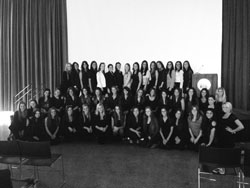Delta Phi Epsilon hosted their second annual Anorexia Nervosa and Associated Disorders (ANAD) Vigil in the Rebecca Stafford Student Center on Sunday, April 14 to bring awareness to the University about the overwhelming impact that eating disorders can have.
Marissa Mieskin, senior member of Delta Phi Epsilon, said, “The media portrays an eating disorder as something superficial, but it is not. By hosting events like this, the impacts of eating disorders become a reality.”
Casey McCabe began the vigil with some facts about anorexia nervosa and other eating disorders.
According to the ANAD website, “An eating disorder is defined as an unhealthy relationship with food and weight that interferes with many areas of a person’s life. A person who struggles with an eating disorder can have unrealistic self-critical thoughts about body image, and his or her eating habits may begin to disrupt normal body functions and affect daily activities.”
McCabe introduced the five women who would share their personal stories.
The first person that shared their experience was Madelyn Mauter, a member of Zeta Tau Alpha. Mauter started out by thanking Delta Phi Epsilon for giving her the opportunity to share her story. Mauter said that her battle began by her simply, “Starting to diet, cutting out meals, and exercising excessively.”
Mauter described how in her personal situation, everything happened so quickly and she felt as though she was “stuck in a cycle,” and that “her new best friend was her eating disorder.” Mauter shared that she had come to a point where she refused to let the disorder control her life anymore. “It was really hard for a while,” said Mauter. “Now I am living for the first time. I am always going to have to remind myself that the image that is staring back at me in the mirror is not the person that rest of the world sees.”
Next, Kristi Hunt, a junior on campus known for her remarkable singing talent and member of Alpha Xi Delta, stated that she hoped that people would be able to connect with her as she shared her emotional experience. Hunt explained that the perspectives of people around us are not always true. Hunt said, “The words fat, ugly, and disgusting have followed me my whole life.”
She explained how she would tell her high school friends that she had not eaten in days and they congratulated her and verbalized that they wished that they could do the same. “This is a disease that affects both men and women. It can affect anyone.” Hunt’s road to recovery was hard. “Every day is a battle, but I am a million times stronger than I was last year,” said Hunt.
Speaking third, Kelly Chapman said, “It is not unusual for an individual with an eating disorder to lie to friends and family to hide the severity of the disease.” Chapman’s own personal experience included purging and starving herself which led to panic attacks and depression. “I never even thought I had a problem,” said Chapman. Chapman pleaded, “If you are struggling with anything, get help as soon as you can. It is not worth the lost time and memories.”
Marissa Meiskin began her struggle in the third grade and throughout her struggle she found “that it was easier for classmates to make fun than to help.” When Meiskin was 15 she was sent to a rehabilitation clinic. “That whole portion of my life seems surreal. I lost my friends. I never had a high school experience.” Meiskin said, “That voice telling you that you are not good enough will never go away, but I know that for me, happiness takes work. I know change is hard, but by sharing my story, I am helping others and bettering myself. I deserve to be loved.”
Lastly, Jessica Jurinich, a volunteer coordinator at Project HEAL and an eating disorder victims advocate and recovery speaker, spoke about how she raises funds and awareness for the cause. Jurinich said, “I know firsthand what it feels like to be a prisoner to the disorder.” At 14, Jurinich was a competitive gymnast who struggled and created the perfect storm for an eating disorder. “Spending time in hospitals made me numb. I would think about everything and analyze how I could exercise more and eat less. I would exercise in the bathroom at the hospital and attempt to find pins to poke holes in my IV.”
Jurinich concluded by pleading, “I urge you, do not let it get that bad. Rock bottom is when you finally realize that the disorder has consumed you’re whole life.”
Victor Nazario, president of Greek Senate, said, “Mental diseases like anorexia nervosa are real and are evident on our campus. These types of disorders are never spoken about, but events like this bring light to situations. This gathering could be the factor to get the ball rolling and keep it rolling.”
As the event came to an end, McCabe said, “Thank you to all the beautiful women who had enough courage today to share their stories and thank you for the organizations that exist to help anyone suffering from these types of diseases.”
The National Anorexia Nervosa and Associated Disorders Association is one of Delta Phi Epsilon’s philanthropies. Besides hosting an annual vigil, Delta Phi Eplison also fundraises and raises awareness for ANAD.
PHOTO COURTESY of Erin Bukowski



